
9 minute read
In talk with Mdm Noor Afifah Abdul Razak, Deputy SecretaryGeneral (Energy) of MESTECC
In today’s era, energy is at the heart of development; we use various forms of energy to build our cities that in turn provide goods, jobs and homes. However, our energy choices and consumption have an impact on the environment.
Case in point, during the period of 1990 to 2016, more than 90% of electricity generated for Peninsular Malaysia was attained from fossil fuel. While the oil and gas industry contributed greatly to Malaysia’s energy sector and the economy as a whole, approximately 20% to the country’s GDP in recent years, the downstream and upstream activities of the industry have greatly impacted our environment such as marine pollution and gas emissions. Further, advances in living standards and the economic development saw an increased demand for electricity that consequently led to the increase in carbon emissions as more gas and coal have to be burnt to meet demand.
Advertisement
Today, nations across the globe are exploring alternative energy sources in their pursuit of social and economic development. Malaysia is also on track to follow suit with government ministries like the Ministry of Energy, Science, Technology, Environment and Climate Change (MESTECC) taking the lead in transforming the country’s energy landscape. The Ministry focuses in three main areas namely wealth creations through Science & Technology; environmental pollution-free and resistance to climate; and creating a green & efficient energy sector by increasing the percentage from 2% - 20% of renewable energy for electricity generation, improve the national energy efficiency as well as the efficiency and transparency of the energy market to ensure the best tariffs for energy consumers. In accomplishing the tasks at hand, MESTECC has launched 73 initiatives to date of which 20 are dedicated to the energy sector. B&I met with MESTECC’s Deputy Secretary-General (Energy) Mdm Noor Afifah Abdul Razak to learn more about the Ministry’s initiatives to transform the country’s energy landscape. B&I: For the benefit of our readers, can you give us a brief overview on Malaysia’s energy sector today? Mdm Noor Afifah: To put it into correct perspective, although MESTECC has the word “energy” in its name, its mandate is only limited to the planning and development of the electricity supply sector. Therefore MESTECC’s is focused in ensuring continuous supply of electricity for the country, and not the energy sector as a whole.
Malaysia’s electricity planning looks at three elements of the ‘energy trilemma’ – reliability, sustainability and affordability. IN TALK WITH MDM NOOR AFIFAH ABDUL RAZAK The Deputy Secretary-General (Energy) of MESTECC shares insights on Malaysia’s energy landscape, the Ministry’s initiatives in driving the sector forward and National Energy Awards
This is a challenge for the Ministry as it is an intricate balancing act to ensure that the country has a reliable supply of electricity, and to make electricity affordable for the people by offering it at a competitive price. On the element of sustainability, the Ministry has to ensure the gas emissions from power generation are manageable and to meet our target under the Paris Agreement.
So that’s the overall scenario of the energy sector. In addressing the ‘energy trilemma’, we have set aside a target of 20% Renewable Energy and 8% Energy Savings by 2025 for the country. We have a lot of programmes in the pipeline including giving out quota for RE in solar and non-solar to help us reach these targets, all of which will be announced by Minister Yeo Bee Yin very soon. B&I: Energy efficiency (EE) and renewable energy (RE) are the main components to establish a sustainable energy platform in Malaysia. What benefits do companies reap from being involved in sustainable energy? Mdm Noor Afifah: Sustainable energy can actually bring many different benefits for companies across all industries. For example, under the Net Energy Metering (NEM) programme organised by Sustainable Development Authority Malaysia (SEDA), the companies are able to install solar PV system to generate electricity for their own use and thus reduce their monthly electricity bill, as well as selling the excess solar energy back to Tenaga Nasional (TNB). The participating companies can invest on their own solar PV system or opt for solar leasing where they pay a lower electricity tariff. The NEM programme has attracted many companies, so we are limiting the quota to 500MW until end of 2020 on a first come first served basis. MESTECC has also established the Energy Performance Contracting Fund (EPC Fund) to spur the nascent energy efficiency service industry. A fund of RM200 million provided by Malaysia Debt Ventures Berhad (MDV) together with the credit guarantee support contributed by the Ministry. In addition, funds amounting to RM5.8 million have been injected to reprofile the financing rate to 7.0% per annum and thus enhance the attractiveness of this financing package. This initiative will be a catalyst for ESCO development and will create a business ecosystem for the energy services industry that is expected to grow based on market-based mechanisms. B&I: MESTECC has recently organised the second edition of the National Energy Award in part of its initiative to promote
Mdm Noor Afifah: The National Energy Awards is an annual recognition to acknowledge outstanding achievements and best practices in driving the country’s sustainable energy sector. The objectives of NEA include: • To give national recognition to any organisations who have made systematic and serious attempts for efficient utilization and conservation of energy in Malaysia during the years preceding the awards; • To promote and disseminate best practices in energy efficiency (EE) and renewable energy (RE) projects in Malaysia;
Further, NEA serves as a platform to identify the “best-of-thebest” among sustainable energy adopters in Malaysia who will then represent the country at the ASEAN Energy Awards, which is Southeast Asia’s highest reward for excellence in the field of energy.
B&I: In your opinion, why are industry awards such as NEA important for industry’s professionals?
Mdm Noor Afifah: Industry awards like NEA are important as they encourage all sectors to be proactive by way of adopting and implementing industry best practices that enhance business growth. NEA promotes EE and RE as well as other energy sources, thus contributing towards attaining objectives of national energy policies. Through this promotion and awareness, we hope the public will understand and appreciate the importance of EE and RE.
B&I: Participants of NEA competed in 2 categories – Energy Efficiency and Renewable Energy. Any particular reason why NEA focuses only on EE and RE?
Mdm Noor Afifah: The Awards focuses on EE and RE because
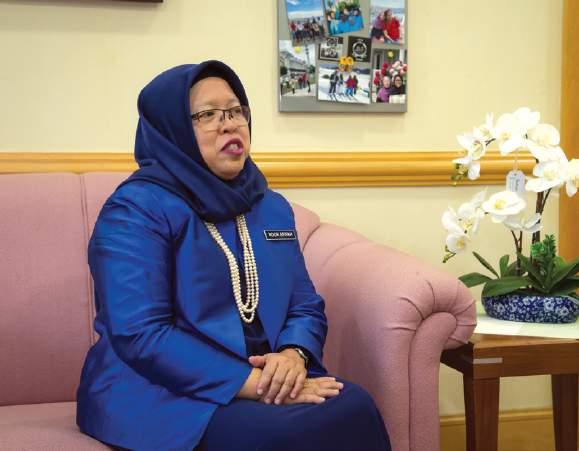
both give a big overall impact to the environment and reduced the greenhouse gas emissions. These areas also bring other advantages and opportunities ranging from environmental to socio-economic.
B&I: Moving forward to the next edition, what can industry players look forward to in the upcoming NEA 2020?
Mdm Noor Afifah: For NEA 2020, we intend to retain “Energy Efficiency” and “Renewable Energy” as the two main categories of the Awards but with a slight addition. For instance, under Category 1: Energy Efficiency – Retrofitted Building, the committee is exploring on adding a subcategory to recognise Energy Performance Contracting (EPC) projects.
The concept of EPC focuses on improving energy efficiency practices in government buildings, which has proven to be effective and successful in many countries. The programme will be implemented by Energy Service Companies (ESCO); it does not involve any investment from the government, instead it is a public-private partnership where the upfront capital costs will be borne entirely by ESCO and all savings gained after the contract ends will be accrue solely to the building owners. Therefore, this will be a special category to recognise these projects and indirectly ESCO as well.
The committee is also considering in introducing subcategories exclusively for IPTs and Financial Institutions. We hope this will encourage more IPTs in adopting and implementing sustainable energy practices in all their development projects, and of course, to reward financial institutions that provide access to financing of sustainable or green-related projects in the country.
B&I: Being the Chairperson of NEA Technical Committee, what do you think of the submissions received for NEA 2019?
Mdm Noor Afifah: NEA 2019 received overwhelming response of 155 applications with the final submission of 77 participants in the 2 categories namely energy efficiency buildings, energy management and renewable energy. This is an increase of 15% from 2018 and is indeed encouraging as it demonstrates the growing commitment and confidence of businesses and institutions in Malaysia in adopting sustainable practices in their operations.
With the winners of NEA will automatically represent Malaysia at the ASEAN Energy Awards, we can also see the impact of NEA as Malaysia organisations or projects won 11 awards in 2018 and 16 awards in 2019 of this regional ASEAN Energy Awards.
B&I: Moving forward, what do you hope to see accomplished in the next edition of NEA?
Mdm Noor Afifah: We have seen an astounding 38% increase of applicants since the inception of NEA and of course, we like to see more participants in the coming editions.
We would also like to see more participation from companies that have received grants under the Energy Audit Conditional Grant. A total of 217 grants have been given to industrial and
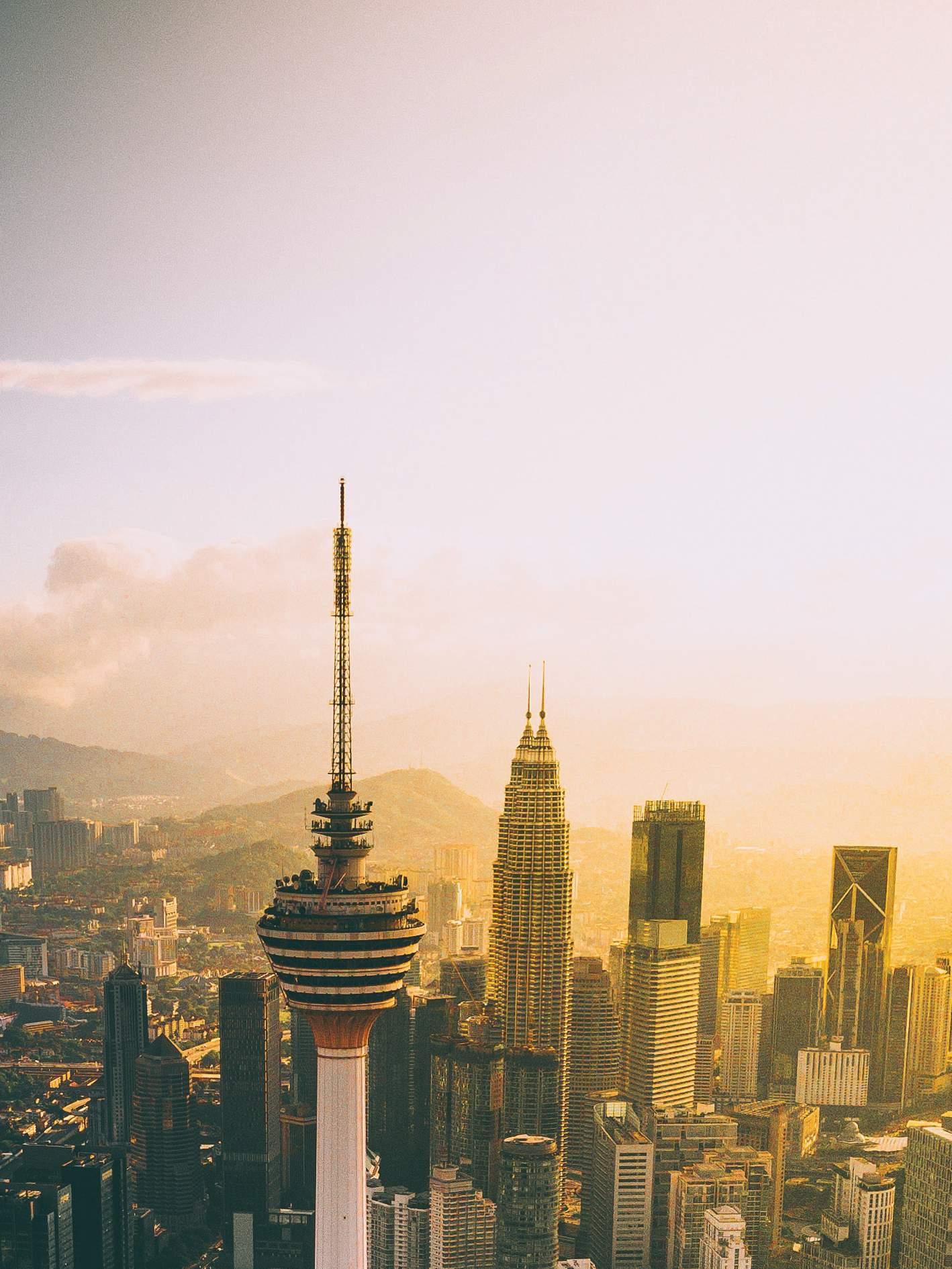
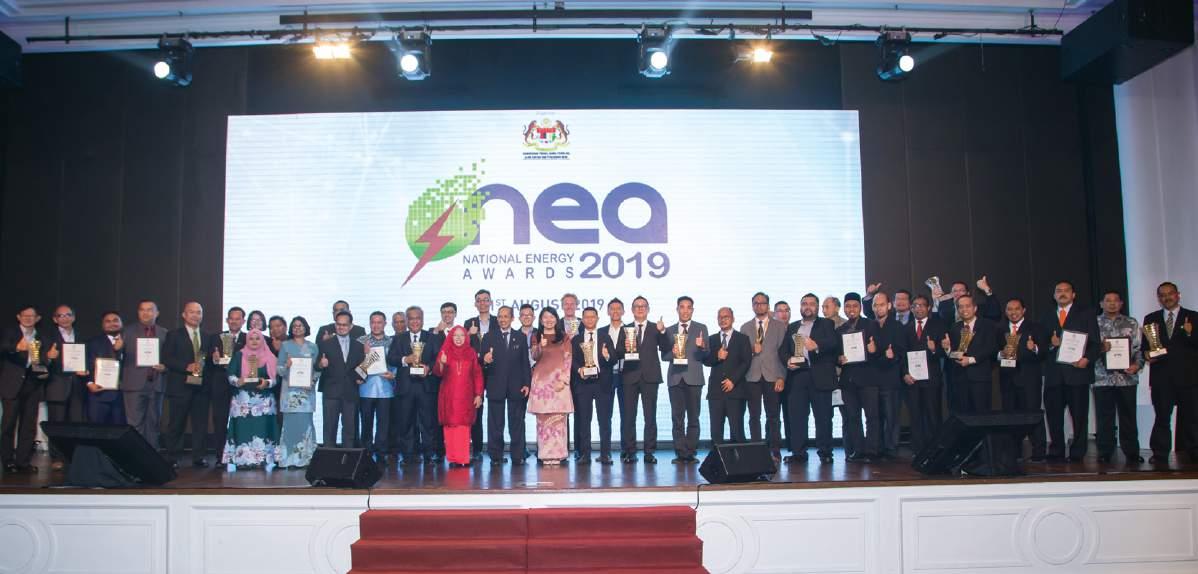
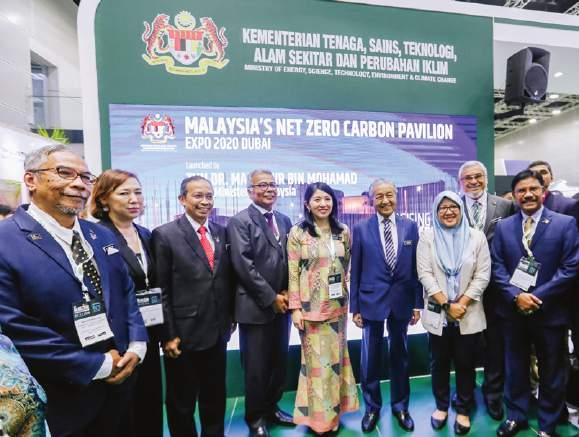

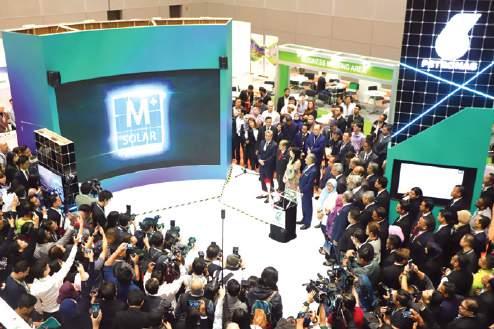
commercial companies to carry out energy audits and implement energy measures in their facilities. NEA is the perfect platform for them to showcase the benefits of the programme, which has reduced energy consumption in tune of nearly 91 million kWh, equivalent to RM34.97 million savings with 69 ktCO 2 reduction in GHG emissions that is equivalent to 17.3 million trees to be planted.
B&I: Is there anything you may wish to highlight with respect to your corporate operations?
Mdm Noor Afifah: For MESTECC, we are walking the talk; the Ministry has subscribed to the myGreen+ with which 10% of our electricity consumption now comes from green energy. myGreen+ is a premium scheme for customers which to buy green energy instead of buying normal electricity. You can learn about this scheme at https://www.tnb.com.my/mygreenplus. The Ministry has also embarked on EE practices; we have retrofitted our buildings with LED lightings, installed motion sensors to control ambient lighting in all rooms. Tentatively, our building has a 4-star Building Energy Index to which we hope to improve to 5-star. The Ministry’s buildings in other parcel are currently rated 3-star, so we need to work harder to improve the rating.
Penang Second Bridge
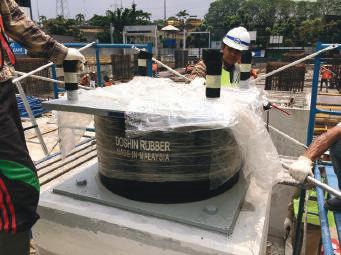

Claudio Vicuna Hospital, Chile
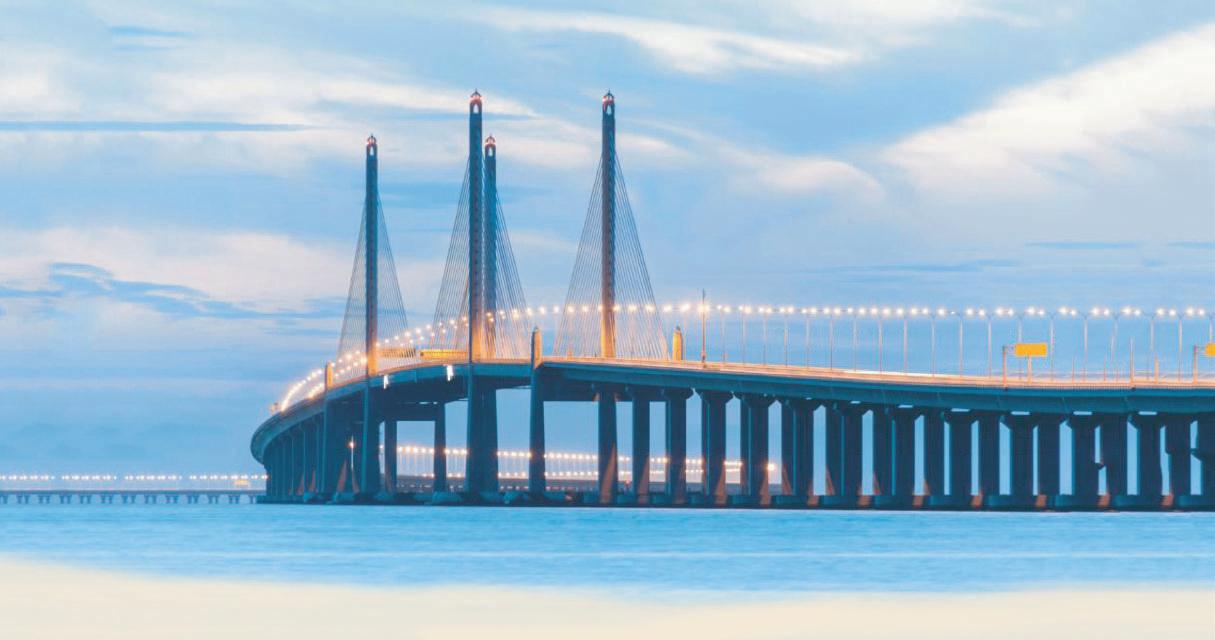
Conventional Fixed-Base System
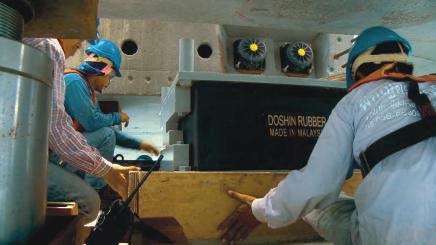
Seismic Isolation System










